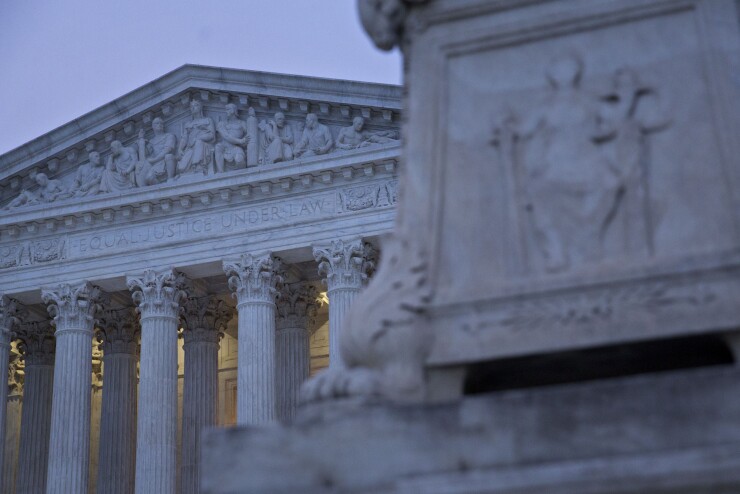President Donald Trump's three U.S. Supreme Court appointees will play pivotal roles as the court considers the fate of his signature global tariffs Wednesday.
Each of the three — Neil Gorsuch, Brett Kavanaugh and Amy Coney Barrett — has generally backed the president in a blizzard of emergency orders this year letting Trump implement his policies temporarily.
But the tariff case will be the
"I don't think it's inevitable that this is going to be a sort of partisan alignment, or the sort of standard 6-3 alignment that we've seen in some other cases," said Roman Martinez, an appellate lawyer at Latham & Watkins who helped file a brief for the U.S. Chamber of Commerce opposing the tariffs.
The case will decide the fate of most of the import taxes Trump has imposed since taking office, including his April 2 "Liberation Day" tariffs.
Trump says the tariffs are authorized by the 1977
Here's a look at how each Trump appointee might approach the case, along with another key figure, Chief Justice John Roberts. The companies and states challenging the levies will probably need the votes of two of the four to win the case.
The court's three liberals Sonia Sotomayor, Elena Kagan and Ketanji Brown Jackson — are likely to vote against Trump. Conservatives Clarence Thomas and Samuel Alito usually side with Trump.
Brett Kavanaugh
Some court watchers say Kavanaugh is the most likely of the Trump appointees to back his tariffs. It's a bit of an unusual spot for Kavanaugh, who in other contexts joins Barrett or Roberts to put restraints on their more conservative colleagues, including Gorsuch.
But Kavanaugh is a staunch advocate of presidential power, particularly when interpreting statutes affecting foreign affairs or national security. "The usual understanding is that Congress intends to give the president substantial authority and flexibility to protect America and the American people," he
Kavanaugh made those comments while discussing the so-called major questions doctrine, an issue that
The doctrine "has not been applied by this court in the national security or foreign policy contexts, because the canon does not reflect ordinary congressional intent in those areas," Kavanaugh wrote.
The best hope for the challengers may be that Kavanaugh will see the case as more about the tariff and taxing powers that the Constitution allocates to Congress than about the president's foreign-affairs and national-security authority.
Even so, the opponents may be hard-pressed to win over Kavanaugh. He "may be less in play for the plaintiffs who are challenging the tariffs," said Elizabeth Prelogar, an appellate lawyer at Cooley who was Biden's solicitor general.
Neil Gorsuch
In contrast, Gorsuch might be less sympathetic to Trump than the conservative justice is in other contexts.
A stickler for statutory language, Gorsuch is likely to have questions about Trump's use of a law that doesn't explicitly mention either tariffs or taxes. The closest the law comes is by saying the president may "regulate" the "importation" of products in emergency situations.
Gorsuch is a staunch advocate of both the major questions doctrine and a related legal argument known as the nondelegation doctrine, which limits Congress' leeway to hand off its constitutional legislative and taxing powers. In the FCC case, he said the nondelegation doctrine was especially important as a check on Congress's ability to give away its domestic taxing power, though Gorsuch said tariffs might be a different matter.
Though he normally aligns with Thomas and Alito, Gorsuch may be more likely to vote against Trump's tariffs than Kavanaugh is, according to Prelogar. "It might actually be the chief, Barrett and Gorsuch who are in play," she said.
Amy Coney Barrett
Like Gorsuch, Barrett is a textualist who focuses heavily on the words of a statute. She has embraced a softer version of the major questions doctrine than some of her colleagues, describing it as a "common sense" tool to help ascertain how much power Congress was handing off.
Because the Constitution vests all legislative powers with Congress, "a reasonable interpreter would expect it to make the big-time policy calls itself, rather than pawning them off to another branch," she
One can imagine Barrett voting to block Trump's tariffs as a similarly "big-time policy call" that Congress didn't authorize. But her opinion didn't mention taxes or tariffs, and she didn't say whether foreign-policy or national-security implications would affect her analysis.
John Roberts
Roberts tends to care less about legal doctrine than the Trump appointees and more about the court's institutional role and practical ramifications.
The chief justice famously cast the deciding vote in 2012 to
Doing so may entail a cost, given Trump's penchant for
"The justices who are going to determine the outcome of this case are going to feel like they need a really pretty strong case on the legal merits before they're going to decide that they're going to cross swords with the president," said Donald Verrilli, an appellate lawyer at Munger, Tolles & Olson and former solicitor general under Barack Obama.
"You can't help but think that that's going to be hovering over the decision-making process in this case," Verrilli added.






